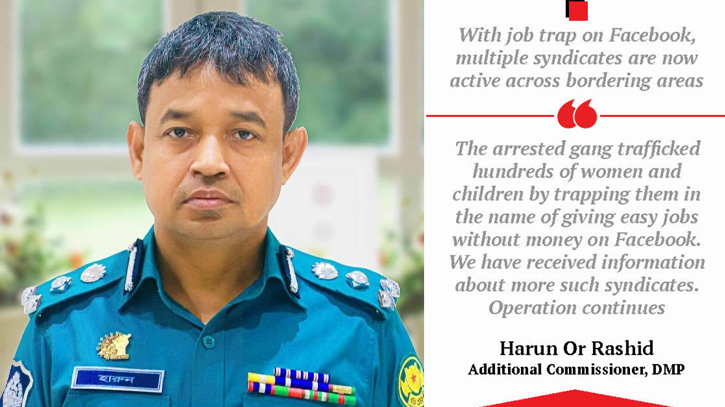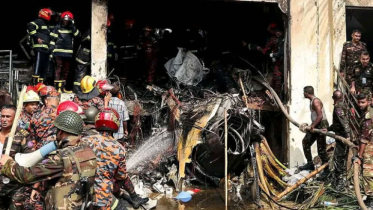
Photo : Collected
Seema found herself abandoned by her husband, leaving her to navigate life's challenges with their only son. Determined to provide for him, she took up employment at a factory in Old Dhaka, where the wages sustained them, albeit with little room for luxuries like her son's education.
One day, a glimmer of hope appeared when she stumbled upon a job advertisement on Facebook. Promising a salary ranging from 15,000 to 20,000 taka, with no educational qualifications required, it seemed like a lifeline. Further inquiries revealed that the job entailed remote work, based in a neighboring country, India, and included provisions for her son's education.
Enticed by the prospect of financial stability and an opportunity for her son's schooling, Seema's father decided to pursue the offer. He was instructed to travel to Kalaroa Upazila in Satkhira, where the promising job awaited her.
Seema and her 10-year-old son, Nawab Sheikh, unwittingly fell into the clutches of human traffickers. Seema, the wife of Johnny Howladar from the Kalibari area of Doulatpur police station in the Khulna district, along with her son, found themselves on the brink of being trafficked.
Their perilous journey was intercepted just in time by the swift action of Mohammad Fazle Elahi, the Additional Deputy Commissioner of Police (ADC) of Dhanmondi Zone within the Dhaka Metropolitan Police’s Detective Branch (DB) Ramna Division, and his dedicated team. They thwarted the trafficking attempt, rescuing Seema and Nawab from the clutches of the trafficking ring.
Investigations by the police uncovered a trafficking network operating on Facebook, enticing vulnerable individuals with the promise of 'easy foreign jobs'. Thanks to the vigilance of law enforcement authorities, Seema and Nawab were saved from a fate far worse than they could have imagined.
Detectives stumbled upon this gang's operation during their investigation into the disappearance of two teenage girls from the Hazaribagh area of the capital.
According to the detective police, the gang, led by the two sons of Abdul Hamid from the Keragachi area, a village of Satkhira's Kalaroa police station adjacent to zero point, had been involved in smuggling young women and children across the border for an extended period, using various deceptive tactics.
Anarul, identified as the mastermind behind the operation, orchestrated the scheme, with his elder brother Kabir Hossain as one of his key associates. The gang operated under the guise of a cow farm in the Anarul area, with Kabir posing as a driver to facilitate the smuggling of women and children collected by the gang.
The Dhaka Metropolitan Detective Police (DB) assert that the gang has trafficked hundreds of women over time. Although Kabir Hossain has been apprehended, the mastermind, Anarul, remains at large, evading capture.
Additional Commissioner of Dhaka Metropolitan Police (Detective Branch) Mohammad Harun Or Rashid disclosed that a recent case was filed regarding the disappearance of two teenage girls from the Hazaribagh area of the capital.
During the investigation of this case, he said, law enforcement uncovered a human trafficking ring that preyed on vulnerable individuals, promising them easy job opportunities without any financial investment through Facebook.
Tragically, even a woman from Khulna fell victim to this deceitful scheme, lured into the trap and subsequently transported to the border area near the Kalaroa police station in the Satkhira district along with her child.
He stated that the gang members had transported her to the Noman's Land area with the intent of trafficking.
However, following the investigation of the case, it was discovered that the gang responsible for the trafficking had already succeeded in trafficking the two girls.
Haroon Or Rashid further revealed that Kabir Hossain, the son of Abdul Hamid from the Keragachi area of Kalaroa police station in Satkhira, was apprehended from the border area.
Subsequently, the identity of the human trafficking gang behind the deceptive job advertisements came to light. It was revealed that the two brothers had trafficked over a hundred women.
Seema Akhter, who was fortunate enough to be rescued from the clutches of human traffickers, shared her harrowing ordeal. She disclosed that her husband had abandoned her long ago, leaving her to fend for herself and her child. Sadly, she lamented the lack of inquiries about her child's welfare.
Seema recounted the hardships she faced, trying to make ends meet on the meager income of three to four thousand taka a month from her job in a factory. The daily struggles were overwhelming, and the prospect of a better opportunity seemed like a ray of hope.
Upon stumbling upon the job advertisement, Seema reached out, desperately hoping for a chance at a brighter future. Subsequently, she received a call from an Indian number, where an individual inquired about her interest in the job offer.
When questioned about the nature of the job, the individual assured Seema that she would be employed in a household, with the added promise of her son's admission to a madrasa.
The allure of a monthly salary of 20 thousand taka further convinced Seema to pursue the opportunity.
Subsequently, Seema received a call from someone located in Satkhira, who instructed her to proceed there. Upon arriving, she found herself being escorted to the border area, where the truth behind the deceptive job offer began to unravel.
Fortunately, Seema's ordeal was cut short when she was rescued by the Dhaka Metropolitan Detective Police (DB) from the perilous situation at the border area, sparing her from the horrors of human trafficking.
Seema, who found herself ensnared in the trafficking ring's trap without possessing a passport, visa, or any financial means, expressed her concerns to the individuals on the phone, explaining that she lacked the necessary funds to cover expenses and did not possess a passport. In response, they reassured her, stating that arrangements would be made for her journey.
Assured by their promises, Seema was led to believe that her lack of documentation and financial resources would not pose barriers. Instead, she was encouraged to embark on the journey, with the assurance that arrangements would be taken care of.
Messenger/Disha








